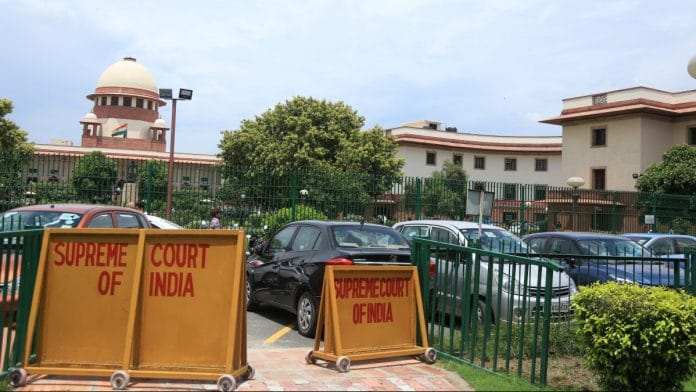Indian courts deal with corruption charges against its judges in two ways: Transfers or looking away.
What happens when a mammoth corruption scandal hits India’s highest court? Some noise initially but eventually, nothing happens.
Exactly a year ago, a bench led by Justice J. Chelameswar heard an urgent plea seeking an independent judicial probe into allegations of bribery in the medical college cases.
That hearing on 9 November 2017 would set off a chain of cascading events that would throw India’s highest court into disarray. From arresting a former high court judge to attempting to impeach then chief justice of India Dipak Misra, the scandal created quite the storm.
Yet, a year later, the allegations of corruption in the higher judiciary have not even been probed into. The scandal has faded from public memory thanks to gag orders and news cycles.
Also read: How the judiciary got into the medical education mess
The medical college case
The Central Bureau of Investigation (CBI) had registered an FIR in September 2017 alleging that I.M. Quddusi, a retired judge of the Orissa High Court had been engaged by Prasad Education Trust, a Lucknow-based medical college to obtain favourable court orders from the apex court by paying a bribe.
Phone transcripts between Quddusi and the medical college management that the CBI had were leaked to the media where the former judge is allegedly talking about offering “prasad” to the “temple”.
The Prasad college case was being heard by a bench led by Dipak Misra and although the FIR did not name him or link him to the case, he acted hastily to douse the fire. Hisnumber 2, Justice Chelameswar, would seize the opportunity to act against Misra, but the former CJI survived the rest of his tenure fighting one controversy after the other. He retired with the legacy of being the first CJI against whom an impeachment motion was initiated.
As a face-saver, CJI Misra, while under the scanner himself, ordered an internal probe against Justice Narayan Shukla, an Allahabad High Court judge for alleged impropriety in another unrelated medical college case.
Meanwhile, Quddusi, members of the medical college trust and the middleman got bail. Quddusi even got a Delhi court to issue a gag order against publishing the phone transcripts in which he is allegedly talking about bribing judges of the apex court.
The CBI is yet to file a charge sheet even after a year.
Also read: New corruption survey says 56% Indians admitted to paying a bribe in last one year
Corruption in the higher judiciary
As always our independent judiciary has looked the other way when corruption in the higher judiciary is debated. Corrupt judges are not a myth but there has not been a single instance where a high court or a Supreme Court judge has been shown the door on corruption charges.
An erring judge can only be dealt with impeachment. So, there are two tactics that the court uses against corruption — to transfer the problematic judge or to simply look away.
There is nothing in between impeachment and looking away, and this is a major impediment to deal with corrupt judges.
In February 2017, the apex court refused to probe corruption allegations against its “two senior-most judges” that were brought to light through former Arunachal Pradesh chief minister Kalikho Pul’s purported suicide note.
When former CJI K.G. Balakrishnan was alleged to have assets disproportionately higher to his income, the activist Supreme Court, after keeping the case pending for over four years asked the petitioner to withdraw the case and instead get an FIR registered.
Another ex-CJI, Y.K. Sabharwal too escaped allegations of corruption even after the Central Vigilance Commission forwarded the complaint to the law ministry for action.
The allegations against high court judges are more in number and far worse. But the transfer policy of the collegium allows the judges to simply be moved states without assigning reasons when allegations become public.
Also read: Indian courts need MBAs and not Chief Justice to deal with pendency
Independence of judiciary
The judiciary gets its power from public confidence, unlike the government which is directly elected by the people. Public confidence nosedives when the guardians of the Constitution are at fault.
The National Judicial Appointments Commission, which was rejected by the Supreme Court, was mooted with arguments such as corruption in the judiciary. The political class obviously benefits from the whole charade. The Congress exploited the medical college scandal against CJI Misra but did not follow it up properly, causing more damage to the institution.
It is trite to say that ignoring instances of corruption in the judiciary undermines its independence. An independent judiciary has become synonymous only with being able to appoint judges without government interference and nothing more.
It is nobody’s case to pronounce a guilty verdict against the judiciary for corruption. Not investigating allegations against itself might help the judiciary pull through in the shorter run, but public perception that the judiciary is corruptible is certainly way more damaging.







Our Prime Minister Sh. Modi Ji wanted and knew that this institution is not trustworthy and should be removed or replaced. He acted accordingly. Now the decisions final upto Supreme Court are not being implemented and their decision is not binding. This way public of country will come to know of this fact and finally will refrain away from this begging for justice system. This was the part of removing some extra laws and rules. No action against Judge, Advocate . Therefore a parallel judiciery has been set up in the name of Grievance Cell or PMO . May God give him success in replacing existing system of Justice.
Yes I think the supreme court should clean it’s house first. Infact they should first give the most harsh punishment the corrupt in their home before judging other’s.